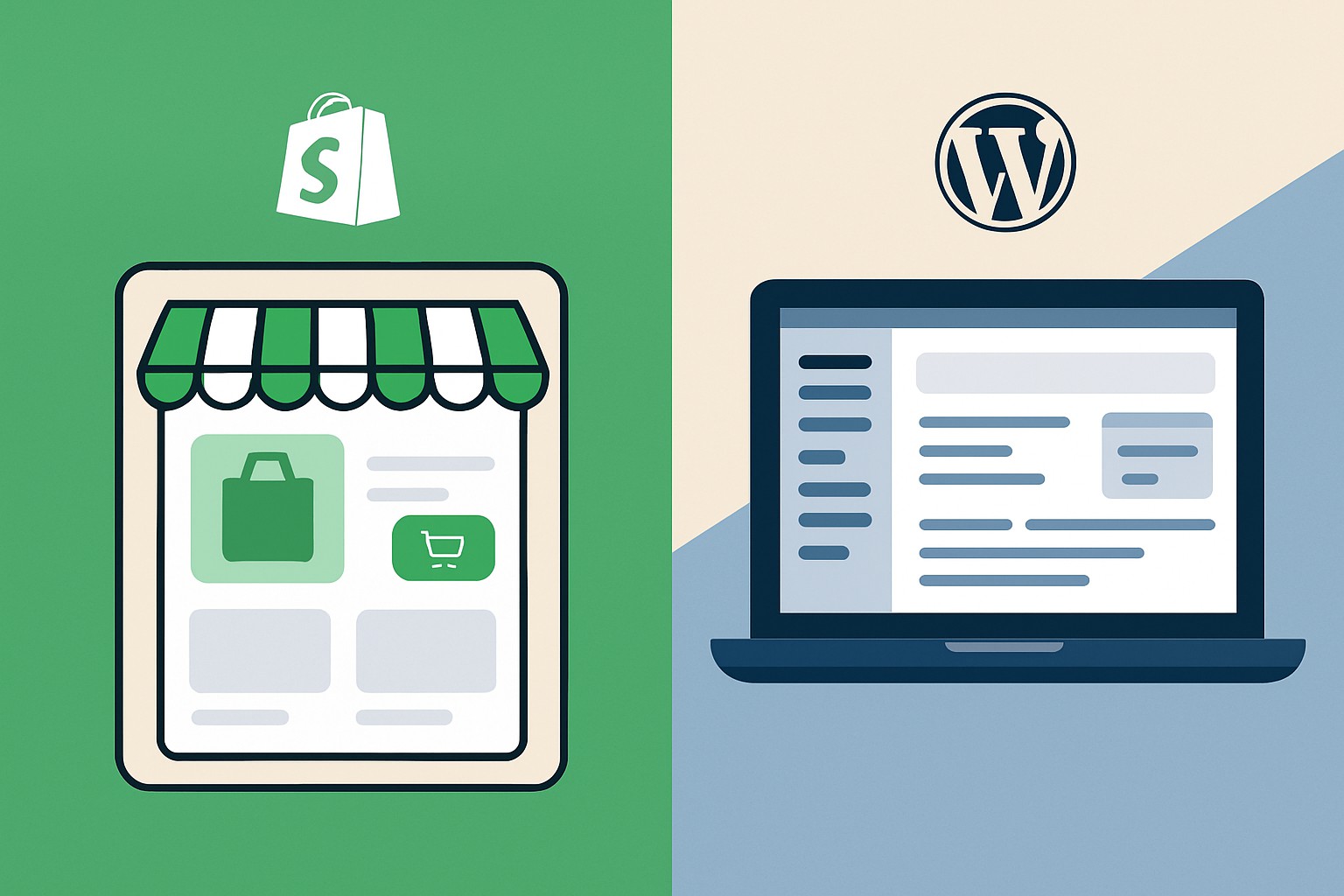Shopify vs WordPress for Your Online Business


Deciding between Shopify and WordPress is a pretty vital step for any online business owner.
Shopify vs WordPress – A Quick Comparison You Can Actually Use
This comparison shines a light on Moz and Mangools across vital areas like pricing, features, and usability to help SEO professionals and marketers zero in on the tool that fits their needs like a glove.
| Key Differences |  |  |
|---|---|---|
| Pricing | Standard $99, Medium $149, Premium $249 per month — pricing tiers that cater to different needs and budgets | Basic $29, Premium $39, Agency $79 per month — a wallet-friendly lineup for those watching their spending |
| Key Features | Keyword Research, Site Audit, Link Building, Rank Tracking — essential tools that pack a punch | Keyword Research, SERP Analysis, Backlink Analysis, Rank Tracking — everything you need to get started without overwhelm |
| Ease of Use | Intuitive interface but beginners might hit a few speed bumps at the start | Straightforward and beginner-friendly interface — a breeze to pick up and start using |
| Target Audience | SEO professionals, digital marketers, and medium to large businesses — basically those who want to dig deep | Bloggers, SEO professionals, and small to medium-sized businesses — perfect for those who want to keep things simple but effective |
| Integration Options | Offers fewer customization and integration options compared to some competitors — not the most flexible, but gets the job done | Limited integrations and less room for customization — which might not thrill the power users |
| Scalability | Provides strong global reach with options that grow alongside your needs — ready to keep up as you do | Works well for small to medium setups but might have some data limitations — so keep that in mind as you grow |
| Support & Updates | Regularly updated and backed by reliable industry support — you won’t be left hanging | Offers steady updates along with accessible customer support — reliable without the fuss |
| Visit Moz Website | Visit Mangools Website |


Shopify is a solid all-in-one eCommerce platform perfect for beginners or anyone who wants to get up and running without breaking a sweat. WordPress, meanwhile, shines because of its vast array of plugins and themes. It’s a great choice for businesses looking to roll up their sleeves and fine-tune every detail.
Round 1 Features and Their Flexibility
When sizing up Shopify versus WordPress in terms of features and customization, focus on the core eCommerce functions and the available extensions. Consider theme variety and how they handle content management. Shopify comes with a neat and tidy set of built-in tools that are tailor-made for online selling—no fuss, just straightforward. Meanwhile, WordPress teamed up with WooCommerce offers more flexibility thanks to thousands of plugins and themes. This gives merchants more control over their site's look, feel, and functionality.
- Shopify comes packed with essential eCommerce features like inventory management and payment gateways and shipping integrations all set up and ready to roll.
- WordPress teamed up with WooCommerce taps into a vast plugin ecosystem letting you add just about any feature you can think of no sweat.
- Shopify offers a curated theme store loaded with mobile-responsive industry-specific designs that usually don’t need much fuss to look just right.
- WordPress boasts thousands of themes including some seriously flexible frameworks perfect for brands that want to stand out with a truly unique vibe.
- SEO tools come built right into WordPress and can be boosted with plugins giving you granular control over metadata and site structure like a pro.
- Shopify includes SEO-friendly features as well but it generally offers less wiggle room compared to WordPress’s full content management system superpowers.
Round 2 Just How Easy It Is to Use and Set Up
Ease of use often steals the spotlight in the Shopify versus WordPress debate. Shopify’s interface is designed for a quick start and doesn’t demand much technical skill. It has drag-and-drop tools and straightforward store management that practically anyone can get the hang of. WordPress, meanwhile, asks you to roll up your sleeves a bit more, such as setting up hosting and fiddling with plugins. This can quickly become a tangled web especially if you’re not tech-savvy.
Round 3 Costs and Pricing That Just Keep Rolling In
Pricing plays out pretty differently when you compare Shopify to WordPress. Shopify comes with neat subscription plans that bundle hosting and support into one package but you’ll want to watch out for transaction fees unless you stick exclusively with Shopify Payments. On the flip side, WordPress is free to use which sounds great but you’ll pay for hosting, premium themes, plugins, and developer help.
| Plan/Expense | Shopify Pricing | WordPress Pricing (Approximate) |
|---|---|---|
| Basic/Starter Plan | $29/month | Hosting usually runs anywhere from $5 to $30 per month — depends on who you go with |
| Mid-Tier Plan | $79/month | Premium themes typically cost between $30 and $100 one-time, give or take |
| Advanced Plan | $299/month | Plugins? They can range from free to over $200, so buckle up for variety |
| Transaction Fees | 2% if you don’t use Shopify Pay | No direct fees, though payment gateways might sneak in some charges |
| SSL Certificate | Included | Often bundled with hosting, but sometimes you’ll have to pay extra |
| Developer Costs | Generally low for most users | Can climb quite a bit depending on how fancy and customized you want it |
Note: WordPress expenses can really swing depending on your hosting provider, themes, and plugins you pick. Shopify pricing is usually more straightforward, but apps can add up before you know it.
Round 4 Taking a Close Look at Performance Security and Scalability
Shopify offers a fully hosted platform built to deliver fast, secure and rock-solid service with PCI compliance and automatic backups so you can pretty much set it and forget it. WordPress performance can vary quite a bit. It depends heavily on your hosting provider and how you set up caching and security. WordPress can definitely scale up impressively but because it is open-source it can sometimes feel like walking a tightrope. Mistakes in management might lead to security issues.
Round 5 Diving Deeper into SEO and Marketing Strengths
When it comes to SEO and marketing, Shopify and WordPress each bring unique strengths. WordPress shines with its robust content management system and many SEO plugins like Yoast SEO that give you control to tweak meta tags, URLs and your site’s structure in detail. Its blogging features are a solid backbone for content marketing strategies that often drive much organic traffic. On the flip side, Shopify comes with essential built-in SEO features and marketing tools like email campaigns and social media integration.
Both platforms play nicely with popular third-party SEO tools like Moz and Mangools. These handy tools offer everything from analytics and keyword research to backlink analysis—crucial stuff if you want your store to shine and keep one step ahead of the competition in search engine results.
Keyword Research
Powerful tools that dig up valuable keywords by analyzing search volume, competition, and difficulty—basically helping you zero in on what really moves the needle for your SEO strategy.
Site Audits
Comprehensive site audit tools that sniff out pesky technical SEO issues, broken links, and any gaps in on-page optimization — so you’re not flying blind.
Link Analysis
Features to keep a sharp eye on backlinks, evaluate link quality, and uncover fresh opportunities for link building that you might otherwise miss.
Content Optimization
Handy SEO suggestions that fine-tune on-page elements, boost readability, and raise overall content quality — all to give your search performance a noticeable lift.
Moz Pro Suite
An all-in-one SEO software package that brings together keyword research, site audits, link analysis, and content optimization tools, all wrapped up in one neat platform.
Moz Local
A dedicated service that manages online business listings and pumps up local SEO by syncing and updating your info across multiple directories — no more chasing down outdated listings.
MozBar Browser Extension
A handy browser add-on delivering instant SEO insights like on-page metrics, link data, and keyword analysis right as you surf the web — no need to switch apps or dig through reports.
Keyword Research
Dig up profitable keywords with detailed metrics like search volume, keyword difficulty, and SERP analysis that really help shape your SEO game plan.
Rank Tracking
Keep tabs on keyword rankings across various search engines and regions so you can watch your SEO campaigns play out over time.
Competitor Analysis
Peek into your top competitors’ organic search tactics, including their strongest keywords and backlink sources, to get the lay of the land.
Backlink Analysis
Take a good look at backlink profiles to sniff out harmful links while uncovering fresh opportunities for quality link building.
KWFinder Tool
A handy tool for digging up long-tail keywords with low SEO difficulty, perfect for bloggers, small businesses, and affiliate marketers alike.
SERPChecker Tool
Delivers in-depth SERP analysis including keyword difficulty scores and performance metrics for the top-ranking pages out there.
LinkMiner Tool
Dedicated to discovering backlinks, monitoring your competitors’ links, and evaluating link health to pump up your link building strategy.
Easy-to-use interface
Built to be intuitive and easy to navigate, making even the thorniest SEO tasks approachable for green beginners and seasoned experts alike.
Affordable Pricing Plans
Offers a range of pricing options from Basic to Agency plans, designed to fit the budgets of both startups and growing agencies.
Round 6 Support Community and Resources
Let’s dive into the heart of the matter the support systems communities and resources that keep everything humming along. Whether you’re flying solo or surrounded by a crew, having a solid backing makes all the difference.
Shopify offers round-the-clock customer support via chat, email and phone backed by thorough documentation designed to help users hit the ground running. Plus, their official forums and partner network are there to lend a hand whenever you need it. WordPress leans heavily on its vast worldwide community and countless third-party tutorials. While the support is undeniably broad, it can often feel a bit scattered and overwhelming.
The Verdict So, Which Platform Comes Out on Top
When comparing shopify vs wordpress, Shopify usually takes the cake for businesses wanting a straightforward and secure way to launch an online store without breaking a sweat—especially if you’re not a tech wizard or running a smaller operation. WordPress shines for companies or solo entrepreneurs who want deep customization and advanced SEO tricks with total control over their content and site layout. Be prepared to roll up your sleeves and invest time and energy into managing it.
Moz stands out as a solid SEO platform delivering deep, actionable insights paired with a robust toolkit aimed at professionals. Sure, the cost and learning curve might give beginners or budget-conscious users a run for their money, but its strong reputation and rich features make it a compelling pick for anyone serious about SEO and boosting online visibility.
Best For
Digital marketers, SEO experts, and medium to large businesses that want an all-in-one SEO solution — complete with advanced analytics and rock-solid industry support.
Highlights
Challenges
Mangools delivers an affordable and straightforward SEO toolkit, packing enough punch to satisfy most digital marketers and website owners. While it might not boast every flashy advanced feature or seamless integration that pricier, more specialized software offers, its consistent updates and no-nonsense design make it a dependable choice for anyone wanting effective SEO tools without the headache of a steep learning curve or a hefty price tag.
Best For
Small to medium-sized businesses, bloggers, and SEO pros who are after an affordable, user-friendly SEO platform that doesn’t skimp on robust keyword and backlink analysis.
Highlights
Challenges
Unlock Digital Marketing Success with Moz
Struggling to optimize your online presence? Moz is the ultimate Internet Marketing solution, empowering businesses with powerful SEO tools, insightful analytics, and expert guidance. Elevate your digital strategies and outshine the competition.
- Boost organic traffic with data-driven SEO tactics
- Enhance content marketing with expert recommendations
- Gain a competitive edge with comprehensive link analysis









